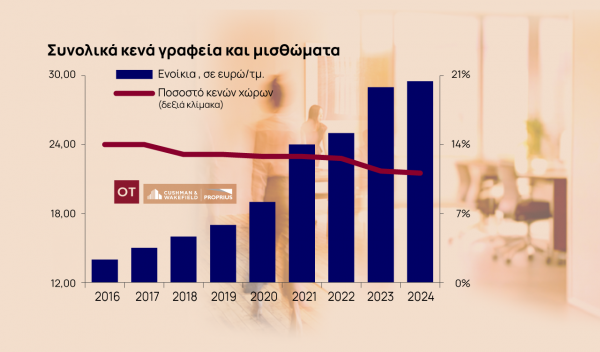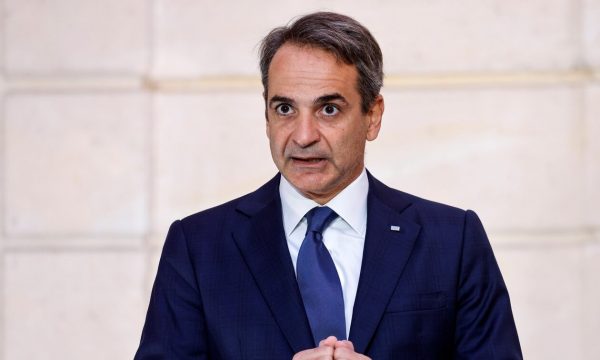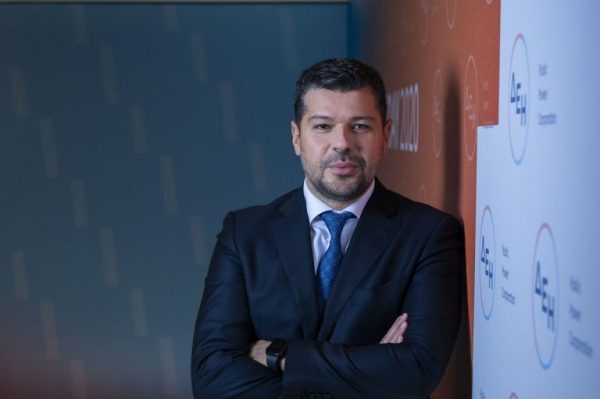
Faced with a fluid environment of emerging risks and external challenges, Greek CEOs are called upon to demonstrate adaptability in order to safely and stably guide their businesses.
The latest edition of EY’s CEO Outlook Pulse survey for Greece captures the goals and priorities of the heads of 30 large Greek businesses as they seek to meet current challenges and strengthen their competitive position in the long term.
Having experienced the more than ten-year economic crisis that hit the country, Greek CEOs appear marginally more sensitive to the prospect of a global economic slowdown, compared to their counterparts internationally.
The entire sample of business leaders in Greece expect a recession of some degree in the global economy, while almost all (97%) expect the same in the markets in which they operate. At the same time, Greek CEOs differ in their estimates of the duration and severity of the recession: 50% (vs. 36% globally) expect a mild but persistent recession in global markets, while 40% (vs. 41% globally sample) predict a severe but temporary recession.
At the same time, more than half (54%) believe that fiscal and policy decisions will mitigate the effects of a possible recession, while 87% are concerned that few of their senior executives have experience running a business in a recession.
Investment plans in the shadow of geopolitical challenges
When asked how their investment plans are affected by global developments, one in two (53%) answered that they are delaying planned investments until the geopolitical climate improves, while almost a third said, equally, that they have stopped investment plans (33%) ), are shifting operating capital (33%) or withdrawing from specific markets (33%). The evolution of diplomatic and economic relations with China (30%) and restrictive regulatory, trade and investment policies (27%) were cited as the most important negative global developments.
However, when asked to name the biggest risk to their business growth, 40% of CEOs in Greece cited growing cyber security threats – the same percentage as escalating geopolitical tensions (40%), and higher than what they gathered from uncertainty around from monetary policy and the increase in the cost of capital (37%).
Strategies to enhance competitiveness
In order for their businesses to emerge stronger from a potential recession and gain an edge over their competitors, half of Greek CEOs (50%) said they are increasing investment in business operations, including internal functions such as finance and accounting processes, as and supply chain and logistics. They will also invest in resilience (47%), including managing geopolitical risk and building digital trust, customer experience and marketing (40%), but also human talent (37%), including wellness (wellbeing) and the development of his skills.
At the same time, they are prioritizing reducing total costs to help maintain profitability and margins (57%), and reviewing projects and capital expenditure (capex – 53%), while outsourcing processes to reduce fixed assets costs (outsourcing – 50%) and complete their digital transformation (50%).
Cautious moves for deals, with a focus on transformation
While all respondents in Greece say they intend to actively pursue a deal in the next 12 months, it appears they will tread carefully, with 57% of executives saying they will pursue joint ventures or strategic alliances with third parties, 40 % will look for mergers and/or acquisitions, while 27% say they will divest. This attitude towards joint ventures is aligned with the priorities of the CEOs and in the global survey sample (58%).
In the context of these alliances, 83% of the CEOs of the Greek companies that participated in the EY survey, give priority to agreements in markets with which Greece has a strong geopolitical and economic relationship.
The benefits of ESG integration are recognised
The heads of the Greek companies comprehend that ESG is now a strategic imperative with real benefits, and not just an optional pursuit. 37% (vs. 39% globally) of respondents report that the main benefit of incorporating ESG criteria into corporate strategy is differentiating their product and service offerings, as well as responding to the changing demands of their customers regarding environmental issues; society and governance. At the same time, the same percentage (37%) state that the integration of such practices improves performance and scores in ESG criteria that can positively influence investors’ decisions. As a third advantage, they rank access to funding sources such as green bonds and sustainability-related loans (33%).
5 key priorities for Greek CEOs in 2023
EY’s research results in five priority axes, which will help the heads of Greek businesses to face the challenges of the coming year:
1. Keeping cool and expanding incrementally – Greek CEOs should approach new ventures and investments in a volatile environment with caution, adjusting or postponing their strategic plans where necessary to mitigate risk. At the same time, they should seize new opportunities in their market or in the markets with which Greece maintains geopolitical and economic relations.
2. Re-evaluate all aspects of business operation – Greek CEOs should closely monitor internal operations, portfolios and external investments, with the aim of re-evaluating their effectiveness and redesigning their strategies and operating models, where he needs. They should also consider whether specific initiatives in place are reinforcing or deviating from the path they have set, and be prepared to make quick decisions to acquire, develop, partner with, or exit operations.
3. Emphasis on employees – In a period of significant macroeconomic turmoil and shortages of specialized business executives in the Greek labor market, existing employees who have accumulated specialized knowledge in their field are the cornerstone of corporate success and a key driver for value creation. CEOs should seek to maintain a satisfied and motivated human capital by listening to their needs and adjusting their approach accordingly.
4. Focus on the future – Despite the understandable tendency to focus on managing short-term challenges, Greek CEOs should also remain focused on long-term growth opportunities.
5. On the customer side – Whether it is investing in new technologies to enhance customer loyalty, or aligning with ever-increasing expectations on ESG issues, Greek CEOs should remain strictly focused on their consumers, in during this period of great upheaval.
Commenting on the research, Mr. Tasos Iosifidis, Partner and Head of the Corporate Strategy and Transactions Department of EY Greece, said: “Greece’s positive economic performance allows Greek business leaders to approach the current unfavorable global economic and geopolitical situation , with composure and determination.
Our research shows that alongside initiatives to address immediate, short-term problems, Greek CEOs are also focusing on long-term challenges, to strengthen the competitiveness and resilience of their businesses, but also to integrate ESG into their business operations . In today’s fluid global environment, they should move with careful steps, enhancing their flexibility and investing in human-centric and customer-centric operating models, to respond to potential new challenges.”
Latest News

China Hits Back at Trump’s Tariffs with New Trade Restrictions, Agricultural Levies
These new levies further tighten restrictions on U.S. agricultural exports, a critical sector that was already hit hard by Trump’s first-term trade war

Eurostat: Greece’s Inflation at 3% in February – Eurozone at 2.4%
In the eurozone, inflation stood at 2.4% in February, compared to 2.5% the previous month.

U.S. Orders Suspension of Offensive Cyber Operations Against Russia
The suspension of these operations is part of a broader review of U.S. activities concerning Russia, and its duration remains uncertain, The New York Times reported.

Exquisite Bronze Griffin Head Repatriated
The artifact is one of the finest cast-bronze griffin heads in existence according to the Metropolitan Museum of Art

Kites, Carnival, and Reflection: Greece Marks Clean Monday, Lent
First day of Great Lent on the Orthodox calendar - Clean Monday - is celebrated with family gatherings and picnics, with Lenten dishes comprised of seafood, legumes and unleavened bread

Israel Halts Gaza Aid Amid Ceasefire Standoff
Israel has announced a halt to all humanitarian aid entering Gaza

Mitsotakis Acknowledges Tempi Protests, Pledges Reform
Prime Minister Kyriakos Mitsotakis acknowledged the record-breaking demonstrations and national strike about the Tempi tragedy in his weekly social media post.

Report: Greater Athens Office Space in High Demand
In the Athens office sector there are currently plans for new developments with a total area of more than 108,050 sqm

First Meeting in D.C. Between Rubio, Greek FM Gerapetritis
State Dept. spox: Greece is a valued NATO Ally and critical to regional stability

On This Day in History: Chemical Structure of DNA Discovered
The double-helix model revealed how DNA replicates and how genetic information is passed from one generation to the next.














![Airbnb: Στα ύψη οι κρατήσεις το 2025 – Το σήμα που στέλνει η αγορά [γράφημα]](https://www.ot.gr/wp-content/uploads/2024/12/airbnb-1-90x90.jpg)
![Ξενοδοχεία: Πόσες νέες πολυτελείς μονάδες άνοιξαν στην Ελλάδα – Οι περιοχές που πρωταγωνίστησαν [πίνακας]](https://www.ot.gr/wp-content/uploads/2025/03/Mövenpick-Resort-Agios-Nikolaos-Sivota-4-90x90.jpg)
























 Αριθμός Πιστοποίησης Μ.Η.Τ.232433
Αριθμός Πιστοποίησης Μ.Η.Τ.232433